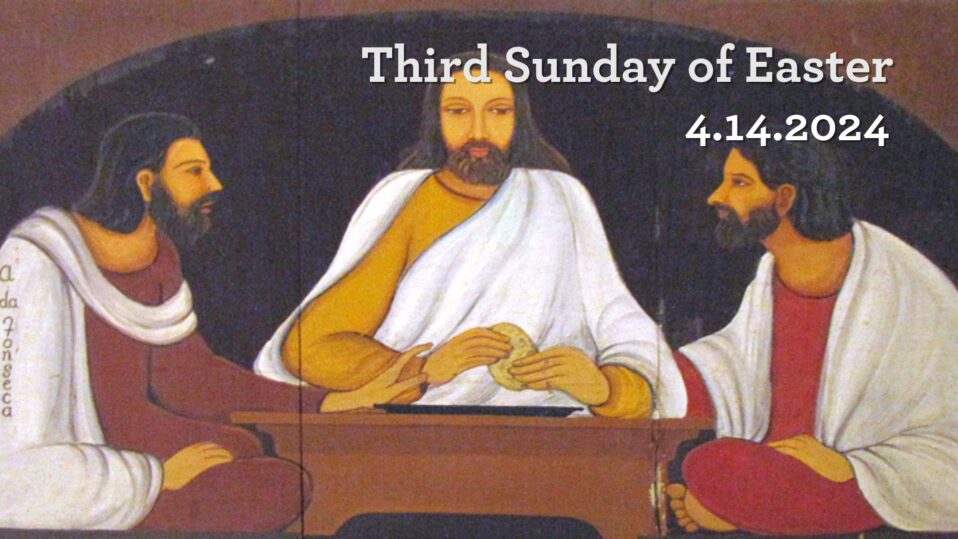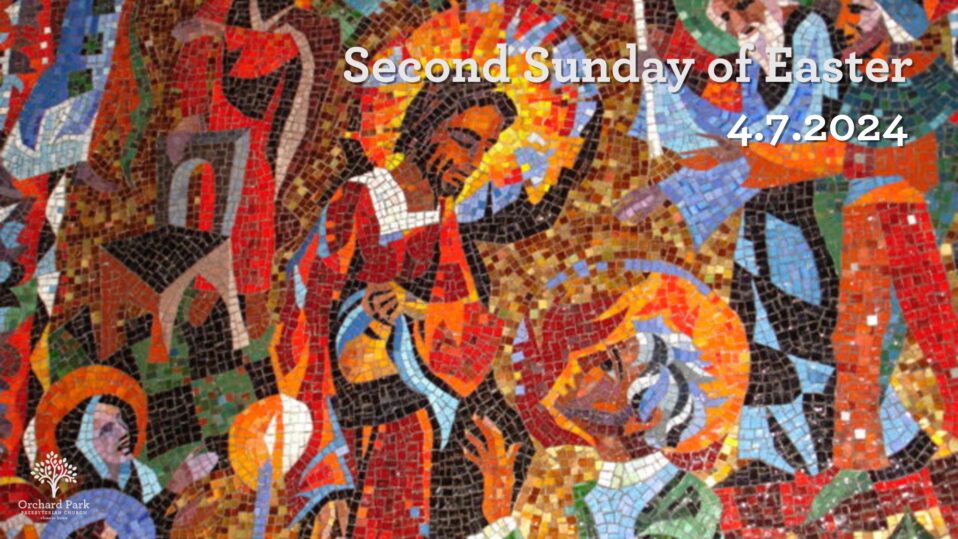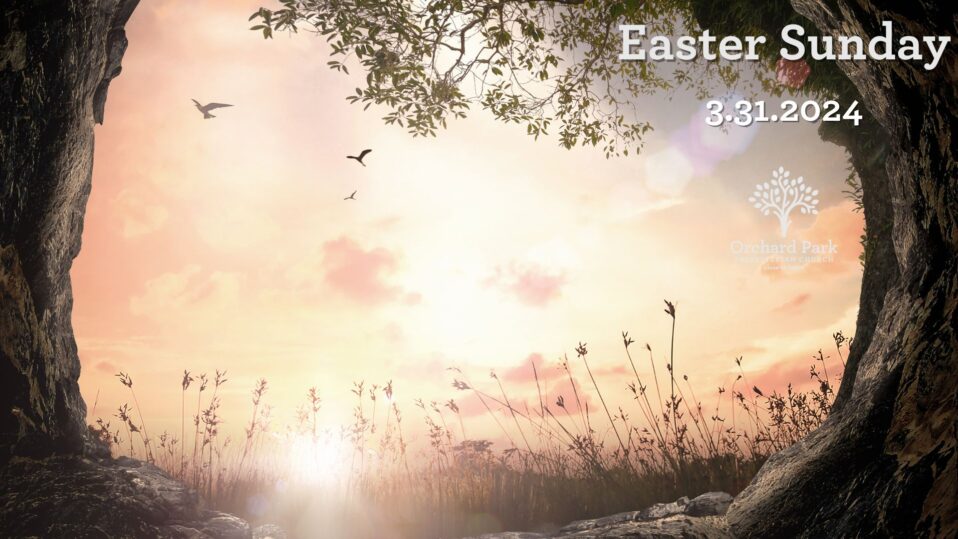Almost every week we stand as a congregation and say together what we believe and recite the Apostle’s Creed. I think of that moment when we proclaim our faith as week after week serves as a restart. Like before you pull out of your driveway, you check your mirrors, adjust your seat and make sure you are safe to back up, reciting that ancient creed serves as a check in of what we believe, before we back out and start another week. In the Apostles Creed are three little words that serve as one sentence. We say them rather quickly without much thought: He ascended into heaven. Of course, the he is Jesus. Today we recognize Ascension Sunday. The 50 days of the Easter season has come to a close and next week is Pentecost.
For many centuries, Ascension Day was regarded as the fourth great festival of the church’s year, along with Christmas, Easter, and Pentecost. But today in many circles it’s almost disappeared altogether. It’s not hard to explain why. Centuries ago, in the parts of the world shaped by Christian faith, people assumed everything in the Bible could be accepted without question. They saw the Bible not only as an accurate account of the character of God and the nature and destiny of humankind – but also as a trustworthy portrayal of the workings of the created world. But gradually, between 1500 and 1800, four things happened. First, the Reformation took away the sense that the Bible spoke with a single voice, because influential people started to interpret the scriptures in startlingly different ways. Second, the Wars of Religion undermined much of the church’s moral authority, because Christianity started to seem less oriented towards peace, and more like a pretext for war. Third, the scientific revolution offered an alternative form of authority for investigating creation, to which it gave a new name: nature. And finally, the philosophers of the eighteenth-century Enlightenment shifted the starting point of their thought from God to human beings. Humanity, rather than God, was now the center of the world, and the measure of all things. If belief in God was going to be credible, it had to fit into the scientific and philosophical matrix we now know as modernity. Christianity had to adjust to these four enormous changes.
If that was what Christians were up against in the 15 and 1800’s, consider what it’s up against today. Christianity today, especially in the United States is more about what the religion can do for us, than what we believe about it. It’s a product that we can decide if we like or need or decide to discard. The whole idea of Jesus being beamed up into heaven is just too odd, so we put it out of our mind. A friend once asked me, “If the Christian faith were an indictable offense, would there be enough evidence to convict you?” Think about that. If all the world were to learn about Jesus Christ through us, what would they know?
Shift the focus away from looking at Jesus in the story and look at what the disciples are doing. Consider that they are asking similar questions. – What’s going on? What do we do now? How are we going to get by?
The ascension is not so much about where Jesus goes, but where the disciples go. They stand there with their necks hinged back and their mouths gaped open, looking at the bottom of Jesus’s feet and the angels intervene and say to them and to us, why are you just standing there looking up? Before we get too judgmental of the disciples, we need to recognize that we do a lot of standing around ourselves. We get stuck waiting for Jesus to do something, waiting for the world to change by itself, waiting for something to happen and we forget that we are the ones called to serve.
We are his feet, his hands, his heart, and if we are a Christian people, a Christian nation, if we wish to witness to the gospel of the Christian faith, we become Jesus in the world now that he has withdrawn from it.
When we say Jesus ascended into heaven, we say that not as much as a reminder of where Jesus went, but where we stand. Do we focus on where he went, or where we are going? When Jesus ascends to heaven that is not the end of the story, but rather the beginning. It’s the beginning of the mission of the church.
William Miller, a former dean of Harvard Divinity School, said, “The task of organized religion is not to prove that God was in the first century, but that God is in the twentieth century and that God’s work gets done by us.”
Our world is no less conflicted, broken, and struggling than the one into which Jesus sent those first disciples. And the marching orders are the same. This Jesus sends us out in his name, this very day, to do just exactly what he sent those first disciples to do.
A priest named Frank Weston wrote, “We cannot claim to worship Jesus in our churches if we do not seek out Jesus in the slums. It is madness to suppose that you can worship Jesus in the sacraments and Jesus on the throne of glory, when you are abusing him in the bodies and souls of his children who have little or nothing. Now go out into the highways and hedges and look for Jesus in the ragged and naked, in the oppressed and the hungry, in those who have lost hope, and in those who are struggling to make good. Look for Jesus in them and when you have found him, gird yourselves with his towel of fellowship, and wash His feet in the person of his children.”
This passage was written over a hundred years ago. It could have been written 2,000 years ago. The basic task of being disciples hasn’t changed since Jesus sent out those first disciples more than 2,000 years ago to a broken world. I have a friend who had a business card with a drawing of Jesus laughing on the front and the quote, “I don’t think this matters to Jesus” on the back and at every session meeting and presbytery meeting when committees debated topics that were laughable, he would throw the card on the table.
Did the first congregation care more about things than they did about people? Did they care more about their traditions than they did about being innovative in the community in which God had placed them? Did they want to cling so tightly to their prejudices that they missed the fact that God was bringing the whole world to their doorsteps so they could fulfill the great commission right there? congregations that refused to be missional die.
We don’t want to merely survive. We want to thrive. We want to make sure that we don’t leave anybody behind. We want to make sure that we reach all for the sake of Jesus Christ. And so, we need to step out and wherever God has placed us to be his agents of reconciliation and of salvation, to all who cross our path on a regular basis.
The moderator of the General Assembly recently spoke at the national capital presbytery meeting and made this observation about thriving congregations:
“A surprising number of churches are healthy and vital because they celebrate intimacy, caring, and high levels of participation. The churches that are thriving are missional. They are focused on something other than themselves, rather than a survival mode inside their walls. A third surprise has been the growing leadership patterns that I see, particularly the health and growth of Commissioned Lay Pastors across this country who serve the church in a healthy and vital way.”
And then she issued a challenge.
“Every congregation needs to have a growth plan and growth doesn’t necessarily mean numbers. A growth plan asks how we can grow in vitality, in evangelical joy in our faith in Jesus Christ, in our passion for mission in the world and in the depth of our community. So, that’s our number one challenge.”
We cannot just stand still and do the same things we have always done in the same ways we have always done them. We have to move.
- By reaching everyone, everywhere, by every means possible with the saving message of faith in Jesus Christ.
- We must pray boldly and allow the Holy Spirit to enable our collective ministries.
- We must examine our prejudices and traditions and we must jettison any of those that render us ineffective in our ministry for Jesus Christ.
- We must engage in our culture, not run from it, so that we might be able to change the world.
- We must deeply love Jesus and love one another.
- And we need to make sure that everyone has the opportunity to enjoy all of the benefits that we have experienced because we have a faith in Jesus Christ, and we have a church family to call home.
Amen.
Rev. Dr. Shelly Wood



